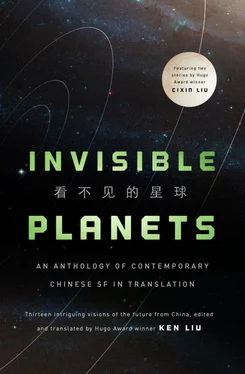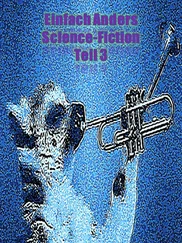“No problem. Take them. But why do you want these?”
God tied up the bundle again. “To study. I’ll start with quadratic equations. In the long years ahead, I’ll need some way to occupy myself. Who knows? Maybe one day, I’ll try to repair our ships’ antimatter engines and allow us to fly close to the speed of light again!”
“Right,” Qiusheng said, excited. “That way, you’ll be able to skip across time again. You can find another planet, create another civilization to support you in your old age!”
God shook his head. “No, no, no. We’re no longer interested in being supported in our old age. If it’s time for us to die, we die. I want to study because I have a final wish.” He took out the small TV from his pocket. On the screen, his beloved from two thousand years ago was still slowly speaking the final word of that three-word sentence. “I want to see her again.”
“It’s a good wish, but it’s only a fantasy,” Qiusheng’s father said. “Think about it. She left two thousand years ago at the speed of light. Who knows where she is now? Even if you repair your ship, how will you ever catch her? You told us that nothing can go faster than light.”
God pointed at the sky with his cane. “In this universe, as long as you’re patient, you can make any wish come true. Even though the possibility is minuscule, it is not nonexistent. I told you once that the universe was born out of a great explosion. Now gravity has gradually slowed down its expansion. Eventually the expansion will stop and turn into contraction. If our spaceship can really fly again at close to the speed of light, then we will endlessly accelerate and endlessly approach the speed of light. This way, we will skip over endless time until we near the final moments of the universe.
“By then, the universe will have shrunk to a very small size, smaller even than Bingbing’s toy ball, as small as a point. Then everything in the entire universe will come together, and she and I will also be together.”
A tear fell from God’s eye and rolled onto his beard, glistening brightly in the morning sun. “The universe will then be the tomb at the end of The Butterfly Lovers . She and I will be the two butterflies emerging from the tomb…”
A week later, the last spaceship left Earth. God left.
Xicen village resumed its quiet life.
On this evening, Qiusheng’s family sat in the yard, looking at a sky full of stars. It was deep autumn, and insects had stopped making noises in the fields. A light breeze stirred the fallen leaves at their feet. The air was slightly chilly.
“They’re flying so high. The wind must be so severe, so cold—” Yulian murmured to herself.
“There isn’t any wind up there,” Qiusheng said. “They’re in space, where there isn’t even air. But it is really cold. So cold that in the books they call it absolute zero . It’s so dark out there, with no end in sight. It’s a place that you can’t even dream of in your nightmares.”
Yulian began to cry again. But she tried to hide it with words. “Remember those last two things God told us? I understand the part about our three brothers. But then he told us that we had to spread bacteria onto other planets and so on. I still can’t make sense of that.”
“I figured it out,” Qiusheng’s father said. Under the brilliant, starry sky, his head, full of a lifetime of foolishness, finally opened up to insight. He looked up at the stars. He had lived with them above his head all his life, but only today did he discover what they really looked like. A feeling he had never had before suffused his blood, making him feel as if he had been touched by something greater. Even though it did not become a part of him, the feeling shook him to his core. He sighed at the sea of stars, and said,
“The human race needs to start thinking about who is going to support us in our old age.”
THE WORST OF ALL POSSIBLE UNIVERSES AND THE BEST OF ALL POSSIBLE EARTHS: THREE-BODY AND CHINESE SCIENCE FICTION
by Liu Cixin
A few years ago, a science fiction novel appeared in China under the strange title Three-Body.
There were, in total, three volumes, and the title for the entire work is Remembrance of Earth’s Past. After volume one, Three-Body (note: the official English title for volume one is The Three-Body Problem ), the next two volumes are The Dark Forest and Death’s End. However, Chinese readers habitually refer to the entire work as Three-Body.
Science fiction is not a genre that has much respect in China. Critics have long been discouraged from paying attention to the category, dismissed as a branch of juvenile literature. The subject of Three-Body —an alien invasion of Earth—is not unheard of, but rarely discussed.
Thus it surprised everyone when the book gained widespread interest in China and stimulated much debate. The amount of ink and pixels that have been spilled on account of Three-Body is unprecedented for a science fiction novel.
Let me give a few examples. The main consumers of science fiction books in China are high school and college students. But Three-Body somehow gained the attention of information technology entrepreneurs; on Internet forums and elsewhere, they debated and discussed the book’s various details (such as the “Dark Forest Theory” of the cosmos—an answer to the Fermi Paradox—and the dimension-reduction attack on the solar system launched by aliens) as metaphors for the cutthroat competition among China’s web companies. Next, Three-Body came to the attention of China’s mainstream literary world, which had always been dominated by realist fiction. Three-Body was like some monster that suddenly erupted onto the scene, and literary critics were baffled by it while feeling they couldn’t ignore it.
The book even had an effect on scientists and engineers. Li Miao, a cosmologist and string theorist, wrote a book titled The Physics of Three-Body . Many aerospace engineers became fans, and China’s aerospace agency even asked me to consult with them (despite the fact that in my novel, China’s aerospace establishment was described as so conservative and hidebound that an extremist officer had to engage in mass assassinations to allow new ideas to flourish). These sorts of reactions are probably familiar to American readers (e.g., The Physics of Star Trek, and NASA scientists regularly teaming up with science fiction writers), but they’re unheard of in China, and they contrast sharply with the official policy of suppressing science fiction during the 1980s.
On the web, one can find many fan-composed songs for Three-Body and readers yearning for a movie adaptation—some have even gone to the trouble of creating fake trailers out of clips from other movies. Sina Weibo—a Chinese microblogging service analogous to Twitter—has numerous user accounts based on characters in Three-Body, and these users stay in character and comment on current events, expanding the story told in the novel. Based on these virtual identities, some have speculated that the ETO, the fictional organization of human defectors who form a fifth column for the alien invaders, is already in place. When CCTV, China’s largest state television broadcaster, tried to hold an interview series on the topic of science fiction, a hundred-plus studio audience members erupted into chants of, “Eliminate human tyranny! The world belongs to Trisolaris!”—a quote from the novel. The two TV hosts were utterly flummoxed and didn’t know what to do.
Of course, these events are only the latest entries in the century-long history of science fiction in China.
Читать дальше












